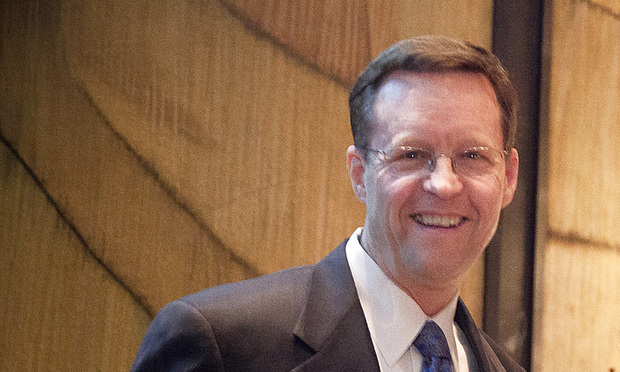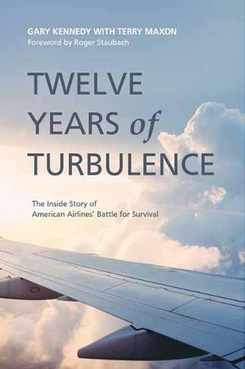 Gary Kennedy, formerly of American Airlines. Photo Credit: Tom Callins
Gary Kennedy, formerly of American Airlines. Photo Credit: Tom Callins
When Gary Kennedy was named general counsel of American Airlines Inc. in 2003, Kennedy won his dream job in what he calls “the sexiest industry in the world.”
His time there was anything but a smooth ride. Kennedy told Corporate Counsel in an interview that from the moment he took the job in 2003 until he retired in 2013, the company was buffeted by crisis after crisis, with the legal department doing much of the navigating.
This month Kennedy’s book, “Twelve Years of Turbulence,” arrived in bookstores telling the inside story of the airline’s fight for survival. Some research and editing for the book was done by former Dallas Morning News aviation reporter Terry Maxon, while former Dallas Cowboys quarterback Roger Staubach, a former AA board member, wrote the foreword.
Kennedy talked with Corporate Counsel about those years. He said he joined the airlines as a staff attorney at its Fort Worth, Texas, headquarters in 1984 after four years in private practice at two law firms in Salt Lake City, Roe and Fowler and Suitter Axland.
The first 10 years were relatively uneventful. AA liked to move its attorneys over to the business side of the company at times, and eventually it moved Kennedy to run its construction and real estate unit for about another decade.
Then in 2003, CEO Don Carty offered Kennedy the general counsel job. “This is a job I set my sights on from [the] first day I entered American Airlines,” Kennedy recalled. “And I was excited. But Carty tempered my enthusiasm, warning it could be a very rough ride.”
 Courtesy of the publisher.
Courtesy of the publisher.
Although he was on the business side when terrorists crashed two AA passenger jets into the World Trade Center and the Pentagon on 9/11, Kennedy said the event traumatized the entire company. Two months later another AA jet crashed in New York in a non-terrorist event, killing all 260 passengers and crew on board.
The magnitude of the losses—both financially and personally—was staggering. “Our pilots, our flight attendants and some other employees were on those planes,” he said. He could barely describe the pain and “the toll on our employees when members of our own company family are lost.”
Kennedy said the airline was brought to its knees and was still struggling two years later. Carty confided in him that the CEO didn’t believe the company could survive.
So one of Kennedy’s first duties as general counsel was to prepare AA to file for bankruptcy. “In April 2003 we were literally in the offices of our outside counsel [Weil, Gotshal & Manges], loading the boxes of documents and getting ready to head to the courthouse to file,” he recalled, when word came that employees had voted to grant concessions. Bankruptcy was averted by a matter of minutes.
But Kennedy said the airline’s officers had angered employees by receiving retention payments while the employees were forced to accept pay cuts and work rule changes. There was a near revolt, and Kennedy took it upon himself to advise the board of directors of the dire situation.
“Just a few months into the job,” Kennedy said, “I had to go to our board and discuss whether the CEO, who had just promoted me, had to resign. He ultimately did. It was a tough position for me.”
Somehow the company persevered for eight more years. But rising oil prices, the aftermath of the 2008 global economic crisis and union problems all took their toll.
The company had to revisit the possibility of bankruptcy, which several competitors had already undergone. Though Carty’s successor, Gerard Arpey opposed it, Kennedy argued that it was needed, before the damage grew any worse.
“We lost a billion dollars in one quarter,” Kennedy recalled.
The board decided to enter bankruptcy, and the disheartened Arpey resigned. Kennedy now found himself working for the third CEO of his general counsel career, Tom Horton, while working to keep his own legal department intact.
Kennedy’s lawyers faced one more major challenge. During the bankruptcy proceedings, US Airways had offered to merge with AA. The company, its employees and its creditors all wanted the deal, but the U.S. Department of Justice cried antitrust and sought an injunction.
So while Kennedy and the lawyers negotiated the sticky details of a merger deal, they also had to figure out how to persuade a recalcitrant DOJ to compromise. In the end, the DOJ did, and both the merger and the bankruptcy moved forward.
Kennedy said the unsecured creditors received 100 cents on the dollar, most employees received pay raises, and shareholders received billions of dollars in new value as AA’s stock prices leaped. “It was one of, if not the most successful restructuring in history,” Kennedy said. American Airlines had a smooth landing at last.
But Kennedy’s time at the company was nearing its end. Horton wanted to place an intermediary between himself and the GC’s office. Kennedy, who had always reported directly to the CEO, disagreed. “So we parted as friends,” he said.
At the time he was 58 and decided to retire in 2013. He said he has used the time to travel with his wife, to write his book and to develop a continuing legal education program based on those 12 years of crisis management to present to bar associations, law firms and other legal organizations.
“We joked that the only crisis we didn’t have,” Kennedy said, “was an infestation of locusts.”
As traumatic as those years were, he has no regrets. “It still was the most exciting time to be general counsel in the history of the airlines,” Kennedy said.
This content has been archived. It is available through our partners, LexisNexis® and Bloomberg Law.
To view this content, please continue to their sites.
Not a Lexis Subscriber?
Subscribe Now
Not a Bloomberg Law Subscriber?
Subscribe Now
LexisNexis® and Bloomberg Law are third party online distributors of the broad collection of current and archived versions of ALM's legal news publications. LexisNexis® and Bloomberg Law customers are able to access and use ALM's content, including content from the National Law Journal, The American Lawyer, Legaltech News, The New York Law Journal, and Corporate Counsel, as well as other sources of legal information.
For questions call 1-877-256-2472 or contact us at [email protected]




